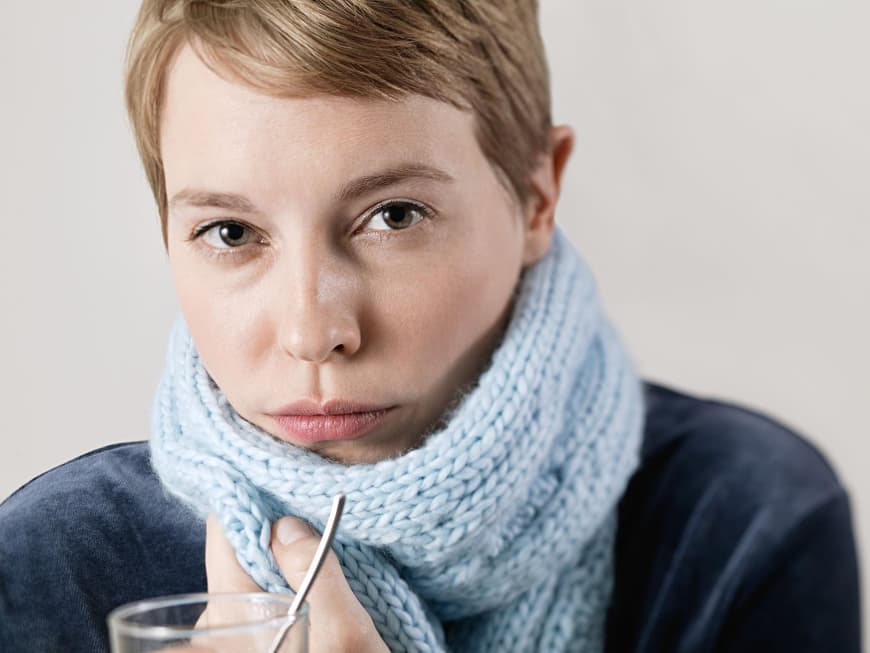
5 cold myths: what's really true?
There is hardly any other health problem that is as riddled with myths as the common cold. You've probably heard that the cold supposedly makes you ill, that going to the sauna supposedly helps when you have a cold, or that vitamin C is the solution. This article takes a closer look at 5 of the most common cold myths.
Cold myth 1: Cold makes you ill
What is not true: The idea that cold alone makes you ill is incorrect. Colds are mainly caused by viruses.¹ It is not the cold itself that triggers colds, but the fact that viruses can spread more easily in the colder months as the immune system may be temporarily weakened by adapting to the cold.²
What is true: What is true, however, is that cold and wet weather conditions can affect the immune system. The body uses more energy to maintain body temperature, which can cause the immune system to be temporarily weakened. It is therefore important to dress appropriately in cold weather to support the immune system and protect against the unpleasant side effects of the cold. It is not for nothing that one of the many cold tips is to keep warm.
Conclusion: Cold alone does not make you ill, but warm clothing in cold weather can support the immune system.
Cold myth 2: If you're ill, you should go to the sauna
What is not true: Going to the sauna when you're sick is not likely to get rid of viruses or shorten the duration of a cold. In fact, in some cases, the heat in the sauna can put additional strain on the immune system ³ and the risk of infection is high in public saunas, where many people share a confined space. Anyone who is acutely ill should never go to the sauna to avoid putting others at risk.
Which is true: Regular visits to the sauna can boost the body's own defenses and thus strengthen the immune system.² Inhaling hot steam can also help to open up the airways when you have a cough or cold.⁴ There is therefore nothing to be said against a kind of mini-sauna when you have a cold. However, people with very low blood pressure or other cardiovascular disorders should refrain from doing so.⁴
Conclusion: It is not advisable to go to the sauna if you have a cold, but inhaling can provide relief for coughs or colds.
Cold myth 3: Vitamin C helps with colds
What is not true: Taking vitamin C in excessively high doses or shortly after the onset of cold symptoms has been shown in studies to have little effect when it comes to preventing or treating a cold.⁵ The body can only absorb a limited amount of vitamin C and excess vitamin C is usually excreted.⁵
What's true: Vitamin C, which is found particularly in citrus fruits or berries, supports the immune system and can help to slightly reduce the duration and severity of a cold.⁵ Vitamin C therefore helps with colds to a certain extent, provided it has also been taken for a long time before a flu-like infection.⁵
Conclusion: Vitamin C helps with colds by slightly reducing the duration and severity of a cold, but overdoses are not useful.
Cold myth 4: Bed rest is mandatory for people with colds
What is not true: The idea that you have to spend all your time in bed when you have a cold is not always true. The importance of bed rest can vary from case to case, depending on how severe the cold is.
What is true: When you have a cold, it's important to get enough rest and sleep to give your body a chance to recover. Sleep is crucial to support the immune system and speed up recovery. While bed rest is significant, one should not isolate oneself unnecessarily. The main priority should be to ensure adequate rest and proper care of your body.
Conclusion: Bed rest is important, but very light activity is often acceptable.
Cold myth 5: Kissing is forbidden when you have a cold
What is not true: The myth that kissing is generally forbidden when you have a cold is an oversimplification. The chance of pathogens being transmitted from mouth to mouth is very low.⁶ This is because it is assumed that the cold viruses that enter the stomach via the saliva are killed there by the stomach acid.⁶
Which is true: Cold viruses are mainly transmitted via droplet infection.⁷ Close contact with a sick person, including kissing, can increase the risk of infection. It is advisable to be careful in close contact with a person who has a cold and, if necessary, to take hygiene measures to minimize the spread of viruses.
Conclusion: Kissing with a cold requires caution and open communication to reduce the risk of infection.
Sources
¹ "The common cold". Health Knowledge Foundation. Accessed October 17, 2023.
²"Well-dosed cold and sufficient sleep strengthen the immune system". Accessed October 17, 2023.
"Relieve colds". The technicians. Accessed October 18, 2023.
⁴ "Inhalation". Accessed October 18, 2023.
⁵ "Does vitamin C keep you healthy?". Accessed October 18, 2023.
⁶ "No danger from kissing with a cold". Accessed October 18, 2023.
⁷ "Droplet infection". Accessed October 18, 2023.







